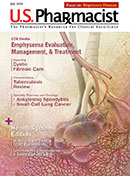In a recent press release, Genentech announced that the FDA had accepted the company's supplemental Biologics License Application and granted Priority Review for Tecentriq (atezolizumab) as adjuvant treatment following surgery and platinum-based chemotherapy in patients with non–small cell lung cancer (NSCLC) whose tumors express programmed death-ligand 1 (PD-L1) >1%, as determined by an FDA-approved test. Atezolizumab is a monoclonal antibody designed to bind to a protein called PD-L1.
Atezolizumab is designed to bind to PD-L1 expressed on tumor cells and tumor-infiltrating immune cells, blocking its interactions with both PD-1 and B7.1 receptors. By inhibiting PD-L1, atezolizumab may enable the reactivation of T cells. Atezolizumab may also affect normal cells. The FDA is reviewing the application under the Real-Time Oncology Review pilot program, which seeks to investigate a more efficient review process to ensure that safe and effective treatments are available to patients as early as possible. The FDA is expected to make a decision on full approval by December 1, 2021.
The application is based on disease-free survival (DFS) results from an interim analysis of IMpower010, the first and only phase III trial of a cancer immunotherapy to demonstrate positive results in the adjuvant lung cancer setting. IMpower010 is a global, multicenter, open-label, randomized study evaluating the efficacy and safety of atezolizumab compared with best supportive care (BSC), in participants with Stage IB-IIIA NSCLC (UICC, 7th edition) following surgical resection and up to four cycles of adjuvant cisplatin–based chemotherapy.
The study randomized 1,005 patients in a ratio of 1:1 to receive either atezolizumab (up to 16 cycles) or BSC. The primary endpoint was investigator-determined DFS in the PD-L1–positive Stage II-IIIA, all randomized Stage II-IIIA, and ITT Stage IB-IIIA populations. Key secondary endpoints include overall survival (OS) in the overall study population, ITT Stage IB-IIIA NSCLC.
The study revealed that treatment with atezolizumab following surgery and platinum-based chemotherapy reduced the risk of disease recurrence or death (DFS) by 34% (hazard ratio = .66, 95% CI, 0.50-0.88) in patients with Stage II-IIIA NSCLC whose tumors express PD-L1 >1% compared with BSC. In this population, average DFS was not yet reached for atezolizumab compared with 35.3 months for BSC. Follow-up on the IMpower010 trial will continue with planned analyses of DFS in the overall intent-to-treat population (including Stage IB patients), which at the time of analysis did not cross the threshold, and OS data, which were immature at the time of interim analysis. Safety data for atezolizumab were consistent with the drug's known safety profile, and no new safety signals were identified. Results from IMpower010, which were presented at the 2021 ASCO Annual Meeting, showed that adjuvant atezolizumab improved DFSby more than one-third in PD-L1–positive, early-stage lung cancer compared with BSC.
Levi Garraway, chief medical officer and head of Global Product Development, stated, "New treatment options are urgently needed in early-stage non-small cell lung cancer to help the nearly 50% of people who currently experience a recurrence following surgery, atezolizumab is the first cancer immunotherapy to show a clinically meaningful benefit in the adjuvant lung cancer setting, and we're working closely with the FDA to bring this significant advancement to patients as quickly as possible."
The content contained in this article is for informational purposes only. The content is not intended to be a substitute for professional advice. Reliance on any information provided in this article is solely at your own risk.
« Click here to return to Lung Cancer Update.
Published September 22, 2021






